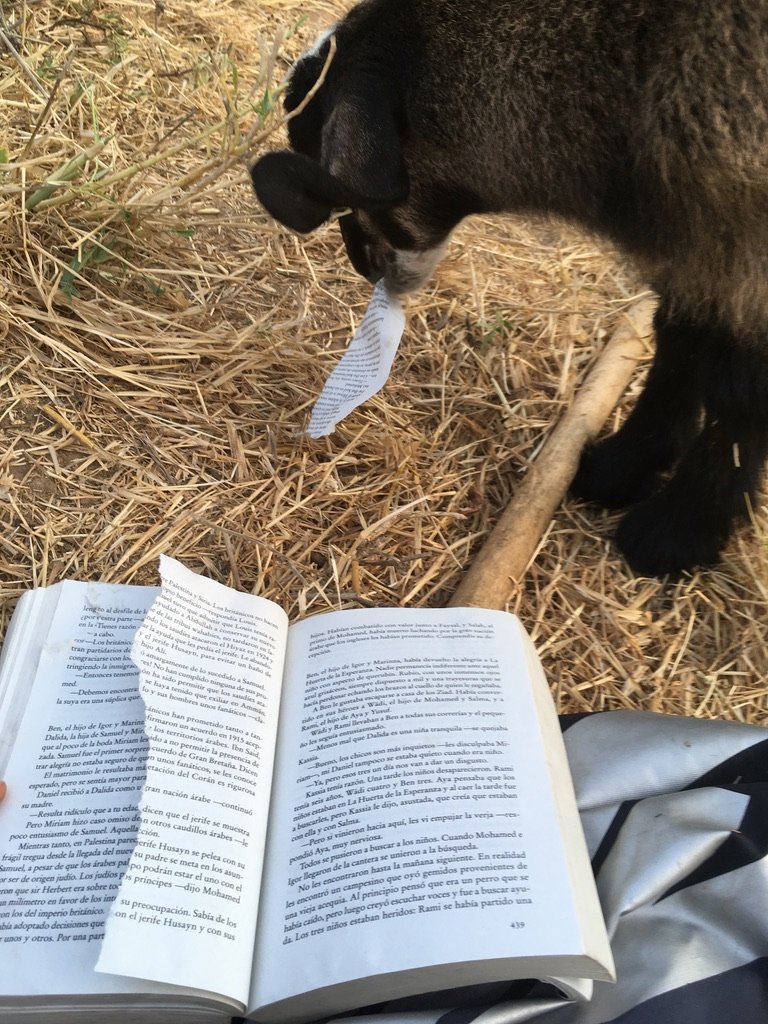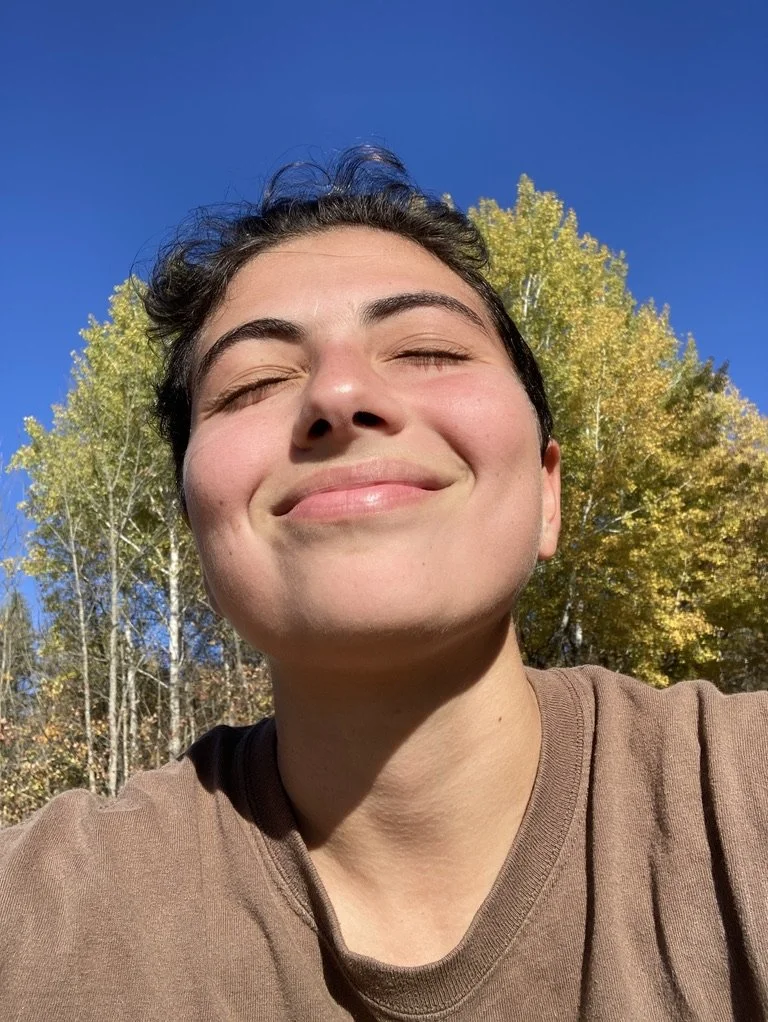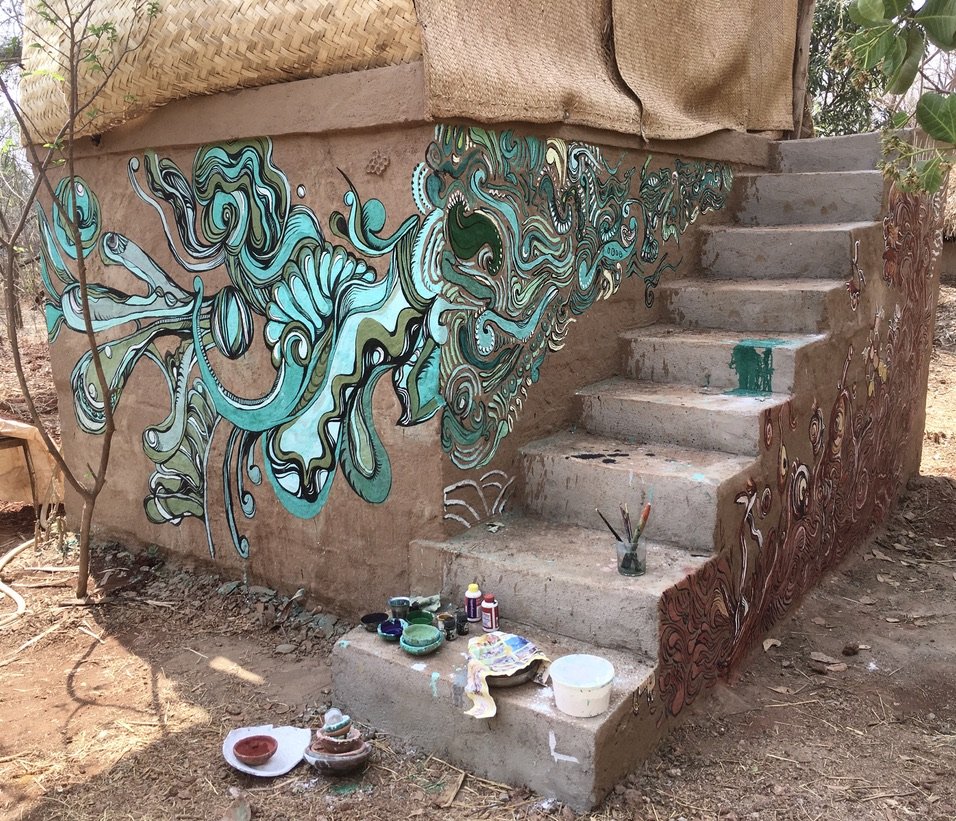MAYA COHEN
MINNEAPOLIS, MINNESOTA
WHAT ARE YOU CURRENTLY DOING? (WHERE HAVE YOU BEEN WORKING, ETC)
I’m trying to figure out what I’m doing. Last year I was a farm manager at a farm plus Native rights community development organization in northern Minnesota. It was crazy because before that I had just worked on a few different farm crews, but then I was thrown into being a farm manager. It was a lot, but I also learned a lot really fast.
I don’t know the total acreage of what we were cultivating because it’s spread out over a lot of pieces of property. The owner has acquired more property recently and there was a goat farm and some larger scale feed and hemp production that I wasn’t involved in. I was doing the smaller scale food crop production, three sisters and beans and a few different types of heritage squash and a lot of heritage varieties of potatoes, a lot of flowers and lots of kinds of vegetables. That was really beautiful and I felt really lucky to have access to those seeds and crops and the diversity and color that is in the varieties that they have.
Last year almost all of that food we distributed to the community. That was also kind of my job, figuring out the system of how we were going to distribute. There was an existing food distribution weekly so we brought a lot of our food there. We gave food to a lot of community events and food boxes to elders on the reservation. .
HOW LONG HAVE YOU BEEN FARMING?
I’ve been farming since the summer of 2019 so that would be four years. It’s been a little bit off and on because I've been moving around. I’ve spent 6 months on one farm, 3 months on another, a season on another and so on.
WHAT INITIALLY BROUGHT YOU TO THE FIELDS?
The first farm that I was ever at was actually in Israel. My family is Jewish, I’m also Jewish. They are Zionist and I’m most definitely not. But I went to Israel for this farm internship program. I was already interested in food systems issues and I fell in love with farming there.
It was a bit random that I went to this program and found farming. I was already very attached to the land. When I was in high school I was an angsty teenager and I would go drive off to the mountains every weekend. I was also interested in environmental issues, but I didn't know that much at that time. I was 18. I ended up on this farm in Israel and I learned so much there. It really changed my life. I felt part of an ecosystem for the first time. I had all these abstract ideas about problems in the world and systems that weren’t working and farming for food sovereignty felt like such a clear direct action - this is something that I can do, that I know how to do. I can grow food for my community.
After that I was at a demonstration farm/ rural development organization outside of Hyderabad, then in New York I worked at a new CSA farm that I really liked at the beginning, but after 3 months it turned out they were pretty white supremacist so it was time to go. I also worked on an urban farm inside of San Francisco, a 3 to 4 acre farm in the middle of the city. It is totally open harvested by the public. We also harvested and distributed for people who didn’t have time to come. It’s a very interesting commons farm.
I worked for a few short periods of time at this farm in Santa Cruz that mostly grows strawberries and pumpkins. It’s adjacent to a lot of industrial farming, so I got exposed to a lot of California's industrial food system there.
I’ve been going back and forth between cities and farming and when I'm in cities I really crave farming.
WHY HAVE YOU CHOSEN TO FARM FOR SOMEONE ELSE (NOW OR IN THE PAST?)
I have chosen to farm for people in the past mostly because it was an obvious choice because I was still learning how to farm and because I'm not ready to commit to owning land…I don't know if I ever will be. I definitely wouldn’t want to have my own farm by myself. I could imagine if I found the right people who I want to farm with that we could start our own farm. But I also don’t necessarily feel the need to. Starting a farm is obviously incredibly difficult so if I can contribute and enjoy what I'm doing at a farm that is already established and is also doing food sovereignty work then I don't see why I would want to start my own thing instead of supporting something that is already existing and doing it well.
WHAT ARE SOME ISSUES FOR FARMERS WORKING ON SOMEONE ELSE'S FARM - ISSUES THAT YOU'VE WITNESSED OR EXPERIENCED?
I think farm labor is really not valued. It’s not considered an actual skill. So for example at this farm that I was just at, I found that our farm team was really under-considered when the people who have decision making power in the organization are thinking about the strategy and future of the organization. The farm team was really transient from a lot of internship programs, people were only there for a small part of the season. I was trying to get across that farming takes a lot of experience and if you’re only on a farm for a couple months, most of the time will be learning and your work will be much much slower than if you had more experience and especially more experience in that place. I couldn’t really communicate that because the people who I was talking to just saw it as manual labor - it’s easy, you don’t have to have skills to do that. They think you can just have one farm manager and you can have a team and you tell the team what to do and the tasks are really easy to do - experience doesn’t matter, it’s just manual labor.
That is obviously totally false and made our farm operation really inefficient.
That is played out in other ways at other farms of not being valued.
Farm labor pays terribly. The max I've ever seen for farm manager jobs still pays $20 / hour and requires way too many hours.
If you’re a farm worker, you’re supposed to just be an anonymous worker, human machine body: I will give you direction and you just carry out this task.
I feel like the challenges of working on farms are so difficult because it’s so hard to change at the level of the farm. It’s a systemic issue. The reason that farmers underpay and mistreat their workers is partially because of social norms and a lack of valuing those people. It’s also because the farmers themselves are struggling so much. Small farms usually can’t pay their workers better and the farmers/farm managers/crew leaders are themselves really stressed and worried about producing as much as possible to make ends meet so they are pushing their farm crew really hard and not having the mental space to care about every human on their farm crew.
The actual answer to this is huge systems change. The reason that farmers struggle so much is because of an industrial food system that cheapens food and farm labor. That is a huge problem that we can only tackle in tiny tiny bits.
What we as farmers/ farm managers can do in the meantime to make it the most humane work environment as possible would be having much more horizontal decision making. Sure there are people with more or less experience and that is something to respect but if you have some struggle you are facing as a farm, be it financial or environmental, instead of that stressing out the manager or owner and that carrying over to mistreatment of all the farm workers, it could be we as a farm tackle this problem together, share the responsibility and burden of that. All would have some say in the best way to deal with it - coming up with solutions that harm all of us together the least.
CAN YOU TELL ME THE QUALITIES OF A DREAM FARM NOT LEADING TO OWNERSHIP - THAT YOU WOULD WANT TO WORK ON?
What is really important to me on dream farms is the mission or work of the farm. Where is the food going and how are they growing? I really enjoy farming even if it’s market farming for white people at a farmers’ market, but for it to be fulfilling enough for me to do long term, what I care about is food sovereignty and access to food for people who don’t usually have access to healthy food. Farming as part of the broader dream of creating just systems that are outside of existing systems designed by the state which aren’t just, and aren’t designed to be just and aren’t going to be just. We all need food to survive. Food is a key part of the economy so creating an alternative economy and ways to support ourselves begins with food sovereignty. I see people in that same struggle all around the world and I feel connected with those people and in solidarity and support with those people.
So, I want to be on a farm that understands itself as part of the network and broader movement and has that mission. Even if they are also living under capitalism and trying to survive and if that means selling food, that also is fine. That's one big thing for a dream farm.
The second thing is feeling like I have relationships of mutual care with my managers and coworkers and hopefully anyone on a team under me also. I want to feel safe being who I am, most likely that means being in a Queer, BIPOC space, but not necessarily. I want to be seen as a human that has ideas and can be creative and has input on what we are doing and also that people educate me by sharing skills and I can also share my skills with them. And if something is wrong or someone is having a bad day, we take care of each other.
“I really enjoy farming even if it’s market farming for white people at a farmers’ market, but for it to be fulfilling enough for me to do long term, what I care about is food sovereignty and access to food for people who don’t usually have access to healthy food. Farming as part of the broader dream of creating just systems that are outside of existing systems designed by the state which aren’t just, and aren’t designed to be just and aren’t going to be just.”
WHAT KEEPS YOU COMING BACK?
I’m a very physical person. I like using my body to do work and a lot of the other areas of work I’m interested in, that’s not the case so much.
I’ve just had a great time farming. I’ve been lucky to be on some fun farm crews. I believe in food sovereignty as a way to create the world that I want to live in.
I feel much more grounded when I have that intimate relationship that comes from farming with the land that I'm on. I feel like whatever obstacles come up when I’m in the city or not as connected to the land, it feels much easier to get lost and lose direction whereas when I feel very close to the land, I feel much more grounded with dealing with whatever comes up.
WHAT IS YOUR TAKE ON THE DIFFERENCE (IF ANY) BETWEEN A FARMER AND A "FARM WORKER"/"FARM EMPLOYEE" BESIDES PROPRIETORSHIP?
From societal indoctrination, the first thing that comes to mind when I hear the word “farmer” is a 60 year old white dude in his baseball cap standing in front of his tractor looking at his corn field. That also comes from working in policy and looking at all these websites of agrochemical companies.
My first image when I think of a farm worker, it’s the farm worker unions or justice organizations that I know - mostly Latino migrant laborers. Obviously that is a good illustration of how different the connotations are of being a farmer versus being a farm worker. To be honest, at the farms that I've been working on, those aren’t the terms that we are using. We use farm owner or farm manager or farm crew. You wouldn’t say farm worker, you’d say farm crew. Farm crew has a very different connotation to me, but it still doesn’t feel dignified. It has a lot more privilege, people are more educated, they come from more privileged backgrounds, but it still feels like this connotation of this unskilled, replaceable human.
There is definitely an imposter syndrome around being a farmer. Now if I’m talking about what I do, I say that I'm a farmer. I found that I get kind of confused or doubtful reactions when I say that because I'm young, people perceive me as female. I'm often meeting people in cities because I'm in cities during the off season, and many people don’t perceive me as white so they think: What, you are a farmer? What are you doing here being you?
I’ve been trying to get over that imposter syndrome and I call myself a farmer anyway because it’s true. I’m a farmer and a farm worker. Once I was a farm manager, I thought, ok it’s time to fully embrace this identity.
WHAT KIND OF SUPPORT WOULD BE HELPFUL FOR PEOPLE WORKING ON FARMS NOT THEIR OWN?
I feel like it’s so difficult because it’s so hard to change at the level of the farm. It’s a systemic issue. The reason that farmers underpay and mistreat their workers is partially because of social norms and a lack of valuing those people. It’s also because the farmers themselves are struggling so much. Small farms usually can’t pay their workers better and the farmers/farm managers/crew leaders are themselves really stressed and worried about producing as much as possible to make ends meet so they are pushing their farm crew really hard and not having the mental space to care about every human on their farm crew.
The actual answer to this is huge systems change. The reason that farmers struggle so much is because of an industrial food system that cheapens food and farm labor and farming. That is a huge answer and huge problem that we can only tackle in tiny tiny bits.
ANYTHING ELSE YOU'D LIKE TO SHARE ABOUT YOURSELF & YOUR RELATIONSHIP WITH FARMING? WHAT KEEPS YOU UP AT NIGHT?
The common ideal that people tell me, people who aren't involved in farming, is to own your own farm. I don’t really think that is the ideal, especially because I have a problem with the concept of land ownership to begin with, especially as a settler on the land that you’re on.
Being an individual or couple owning a farm and managing your own crew doesn’t seem like the ideal.
It’s hard to be a farm worker, but it’s equally hard and stressful to be a farm owner, just in different ways. Having more of a position of leadership, you have more responsibility, you can’t just leave that farm if it’s not working out for you. For farm workers, that of course also depends on your position and privilege, whether you can leave.
I see individual farm owners, especially ones who are trying to do things well, farm ecologically, give back to the community through farming, they struggle, it’s hard. The systems are not set up to succeed.
It’s a systemic issue, it’s not just farm owners and how they decide to treat their workers. Becoming the farm owner is not the ideal end point. I would much rather the situation of shared or collective ownership rather than trying to put all the responsibility to one person at the top.
The reason people think farm ownership is the ideal is one - conditioned capitalism, two - because it’s a short term solution. They think, okay you are having a problem that your farm owner isn’t paying you enough or treating you well, then by being the owner you can decide to treat yourself well or decide to earn more money. It’s all of these symptomatic issues. It comes with its own issues and in farming there is very little to go around so the way that farm owners end up having a more comfy life is by mistreating their farm workers.
For me that is very much not the goal.
WHAT IS YOUR OPINION/TAKE ON THE FARMER LUNCH? (DO YOU TAKE LUNCH, DO YOU SKIP LUNCH, DO YOU ENJOY TAKING LUNCH WITH YOUR CREW - FOR COMMUNITY BUILDING, IS THERE PRESSURE TO BE SOCIAL....)
It’s definitely dependent on the farm. There are farms where I’ve taken rough lunches or skipped lunch because I feel rushed. There are also farms that I’ve been on that have made lunch like a ritual and we cook and eat lunch together and that’s been really nice.




